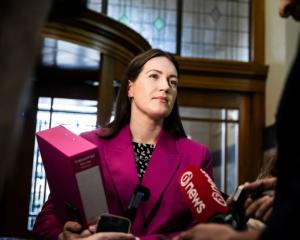The Green Party have lodged a complaint with the Human Rights Commission over new legislation allowing employers to pay 80 per cent of the minimum wage to those aged 19 and under.
The Minimum Wage (Starting-Out Wage) Amendment Bill had its first reading in Parliament today and passed by 61 votes to 59.
It was supported by National, Act and United Future and opposed by Labour, the Greens, New Zealand First, the Maori Party and Mana.
The Bill will allow employers to pay staff aged under 20 a "starting out'' wage of $10.80 an hour for the first three months of their employment.
Three groups will come under the new rules:
- 16 and 17-year-olds in their first six months of work with a new employer,
- 18 and 19-year-olds entering the workforce after more than six months on the benefit,
- 16 to 19 year-old workers in a recognised industry training course involving at least 40 credits a year.
Green Party co-leader Metiria Turei said under the legislation, young people who had been on a benefit for more than six months would be able to be discriminated against.
She said it was illegal under the Human Rights Act to discriminate on the basis of young worker's employment status.
"Those 18 and 19-year-olds who have not been on a benefit face missing out on jobs, and those who have been on a benefit face missing out on pay.''
Labour's labour spokeswoman Darien Fenton said the legislation did not explain how employers could check if a young worker has been on a benefit for six months.
"Given the current issues around privacy breaches it is questionable as to whether Work and Income should be able to provide that information to employers.''
Ms Fenton reiterated the Green Party's stance that it is illegal to discriminate on the grounds of employment status.
"The Government does not believe in young people, it does not like young people, and it dislikes them so much it's going to give them a pay cut,'' she said.
Labour Minister Kate Wilkinson said the introduction of the new wage, from April next year, would help young New Zealanders get into the workforce.
"The new starting-out wage will help some of our youngest and most inexperienced workers get a much-needed foot in the door, in what is currently a tight labour market.''
Youth spokesman for the Council of Trade Unions James Sleep said youth rates will not address high levels of youth unemployment.
He said advice given to the Government by the Ministry of Business, Innovation and Employment indicates that when youth rates are implemented there will always be a group of workers losing out on jobs; with modelling indicating it could lead to a net loss of up to 2700 jobs over two years.
"Youth rates will shift jobs around different age groups, and the Government's own advice suggests at any one point a group of workers will be displaced from work. All workers should have the same minimum wage floor to ensure workers are not displaced because of their age.''
"There are currently 13,700 young people aged 18 and 19 who are struggling to find work or get into further education.''
He said many of these young people will be living away from home, and face the same living costs as other New Zealanders.
"They need a decent, secure job that pays a wage that allows them to pay for rent, food and other expenses. A youth rate will drive these people into relative poverty.''













